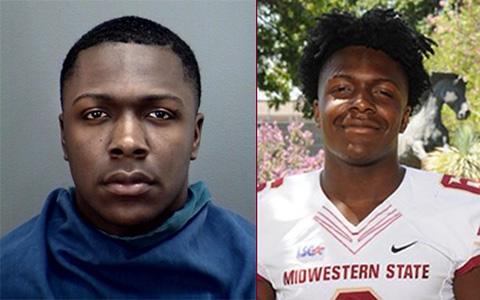
Rodney Roshunn Higgins Jr., 19-year-old former cornerback, was arrested and charged with sexual assault on Tuesday, April 18. Both he and the victim were residents of Killingsworth Hall when the victim reported the incident to university police two days before.
Killingsworth Hall has been known as the all-female dorm until Pierce Hall closed for renovations in December. The residents and resident assistants of Pierce Hall were transferred to the fifth and sixth floors of Killingsworth Hall when classes resumed in January.
“It’s important to remember that Killingsworth has not always been single-gendered,” Kristi Schulte, director of residence life and housing, said. “It’s been co-ed in the past, so it’s important to recognize that [we moved Pierce residents into Killingsworth] based on occupancy, not necessarily whether men and women should be separated for those purposes.”
Though Pierce and Killingsworth residents were combined in the same building for the spring semester, Schulte said Killingsworth will go back to all-female and Pierce will go back to all-male, but not based on sexual assault cases.
“We are anticipating increased occupancy, and with that, we’ll see a higher percentage of female students on campus, so we need the space for the women,” Schulte said. “Killingsworth will be all-female and Pierce will be all-male based on occupancy projections.”
Another sexual assault report was submitted to the University Police Department on Monday, May 1 at 2:48 a.m. in Killingsworth Hall. Schulte said she still does not see a connection between the Pierce residents moving into Killingsworth and the two sexual assault cases within the last two weeks..
With any sexual assault case, Title IX Coordinator and Dean of Students Matt Park said the protocol includes separation of parties, both criminal and campus investigations, and a faculty and staff conduct committee hearing before determining the possible punishments.
“The first thing that happens is the fact-finding process. It is essentially this impartial evidence collection, which is going to typically be done by either one of the conduct officers or, in cases of sexual misconduct, harassment or other types of discrimination, we assign two investigators to collect the information,” Park said. “If there’s enough evidence collected, a charge is filed, then the hearing comes in.”
The investigation of Higgins’ charge is still ongoing — police investigations can take up to two weeks before the campus investigation starts. No conduct committees have met in regards to a sexual assault case, according to Park.
“If there is a charge and a hearing, that will take some time to get to because there has to be an investigation and the neutral, fact-finding first,” Park said. “This is a case where there is a criminal charge, and in that case, we as a campus are wanting to make sure that we respect the integrity of that criminal investigation, because it does have significant implications.”
Federal law and the Office of Civil Rights determined that the entire process of an alleged conduct violation should be completed within 60 days, depending on the circumstances. Park said that even though the semester is coming to a close, that doesn’t mean the investigation will stop.
“It’s an invisible number; it’s not a hard number. But that’s the expectation though. We can’t let these types of cases linger and hang out there. We can’t ignore them,” Park said. “The end of the semester that comes with spring commencement does not mean we have to have everything worked out by then. We can continue past that date, and that’s normal.”
Depending on the circumstances, a student who has been arrested for, charged with, or allegedly committed a sexual assault can be removed from campus housing, but Schulte said it is “not an easy yes or no question.”
“Speaking generally, because I don’t want to go into specific cases, there may be situations where there is an acquaintance scenario or where there has not been anything to indicate that there are significant safety concerns. The result may be a separation of parties — moving to different areas, restricting access to different areas, etcetera,” Schulte said. “But if there is a determination that there is a violation or an alleged violation is significant enough, then we can remove them from campus.”
Schulte confirmed that Higgins is no longer a resident of campus housing.

















